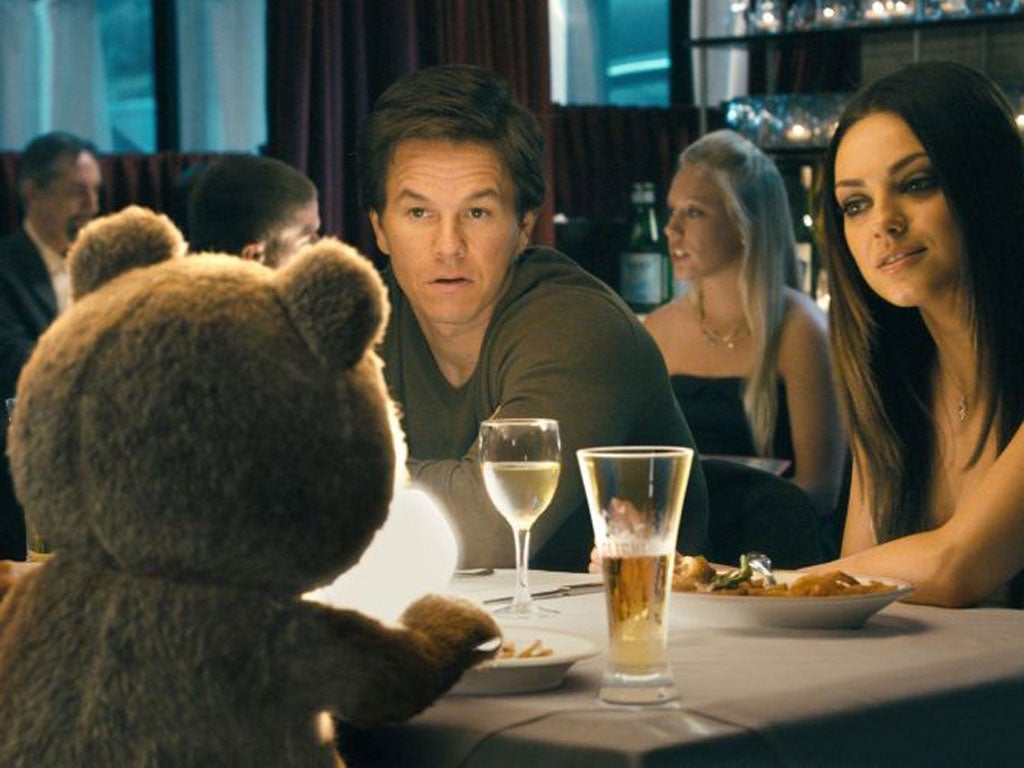Ted, Seth MacFarlane, 106 mins (15) The Flowers of War, Zhang Yimou, 146 mins (15) A Simple Life, Ann Hui, 119 mins (PG)
If you go down to the flicks today ... you'll see a man and his teddy struggling for laughs in a tale suffering arrested development

Seth MacFarlane, the creator of Family Guy and various other post-Simpsons cartoons, has hit upon a corker of a premise for his debut film, Ted. It starts with a lonely boy wishing that his teddy bear would come to life. Twenty-seven years later, the boy has grown up to be a man (Mark Wahlberg) with a job and a girlfriend and a serious marijuana habit – but he's still living with a talking stuffed animal, now computer-generated and voiced by MacFarlane.
It takes about 10 minutes to get to this point in the film, and already it doesn't make sense. Why, for instance, would an eight-year-old boy wish for a magical teddy bear rather than a magical Optimus Prime? And how does a drug-addled couch potato manage to maintain Wahlberg's movie-star biceps? Even in a comedy about a sentient soft toy, that's stretching credibility. But to ask any of these questions is to put more thought into the film than MacFarlane has. Having dreamt up his excellent premise, it's criminal how little he does with it.
Ted is basically a very familiar comedy (see also Shaun of the Dead, Knocked Up, etc) about a man-child who has to clean up his act to win back his insanely patient girlfriend, Mila Kunis. In this instance, cleaning up his act means installing his foul-mouthed, dope-smoking flatmate in a place of his own, a task so insignificant that no one even pretends that it generates any tension. Making the foul-mouthed, dope-smoking flatmate a teddy bear is funny at times – although last year's Simon Pegg comedy, Paul, did much the same thing. What's really perplexing, though, is that up until the chase sequence that finishes the film, it's almost irrelevant that Wahlberg's best buddy is made of polyester. In just one of the screenplay's impossible-to-accept propositions, everyone in Boston is so used to seeing an enchanted bear that they don't give him a second glance.
And if the story is lazy, the jokes are even lazier. MacFarlane's humour marries the worst tendencies of Ricky Gervais and Judd Apatow, in that half of his punchlines rely on irony-veiled racism, sexism and homophobia, while the other half are pop culture references, as if mentioning James Bond or TJ Hooker were hilarious in itself. Wahlberg and Kunis make an agreeable couple, but it's hard to understand why no one ripped the stuffing out of the teddy bear a long time ago.
The release of The Flowers Of War is doubly well timed. First of all, it stars Christian Bale, so that anyone who felt that The Dark Knight Rises wasn't quite long enough can watch him for another two and a half hours. And second, it's directed by Zhang Yimou, who, as well as directing Hero and House of Flying Daggers, masterminded the opening ceremony of the Beijing Olympics.
Like that ceremony, it's not exactly subtle. It's one of several recent films to be set during "the rape of Nanking" in 1937, when Japanese soldiers reduced much of China's then capital city to rubble, butchering and torturing the populace as they went. One of the few Westerners there is a hard-drinking American opportunist (Bale) in an Indiana Jones fedora, who ends up in a Christian cathedral compound, mainly because he thinks it might contain something worth stealing. But when Japanese troops burst in, he has an incredibly sudden change of heart, disguising himself as a priest in order to shield a dozen convent girls, as well as the dozen courtesans hidden in the basement.
The Flowers of War is the Chinese equivalent of a Steven Spielberg film, horrific in its graphic depictions of death and devastation, but also a sentimental, awards-friendly love story and rousing boys' adventure movie: one sequence has a sharp-shooting Chinese soldier despatching a Japanese platoon singlehandedly. But like most Spielberg films, and that opening ceremony, it's an undeniably effective, skilfully assembled spectacle. And it's always a relief to see the cavalier Bale of Rescue Dawn and The Fighter, rather than the clenched Bale of the Batman films. The two Bales have one thing in common, though: they both shave off their shaggy beards to signal that they're ready for action.
Andy Lau, who starred in House of Flying Daggers, appears in A Simple Life, a film which could hardly be more different from a Zhang epic. It's a quiet, naturalistic drama about a film producer (Lau) and the maid (Deanie Ip) who has served his family in Hong Kong for decades. Most of the family has now emigrated, so Ip is left cleaning Lau's bachelor flat until a stroke puts an end to her working life. Determined not to be a burden on her former employer, she insists on moving into a nursing home – and she insists on staying there, despite its resemblance to the asylum in One Flew Over The Cuckoo's Nest. But Lau keeps visiting her, and a heartwarming mother-son intimacy grows between them. Ann Hui's film is a searing account of the indignities of old age, and a moving paean to the companionship that can render those indignities bearable.
Subscribe to Independent Premium to bookmark this article
Want to bookmark your favourite articles and stories to read or reference later? Start your Independent Premium subscription today.

Join our commenting forum
Join thought-provoking conversations, follow other Independent readers and see their replies